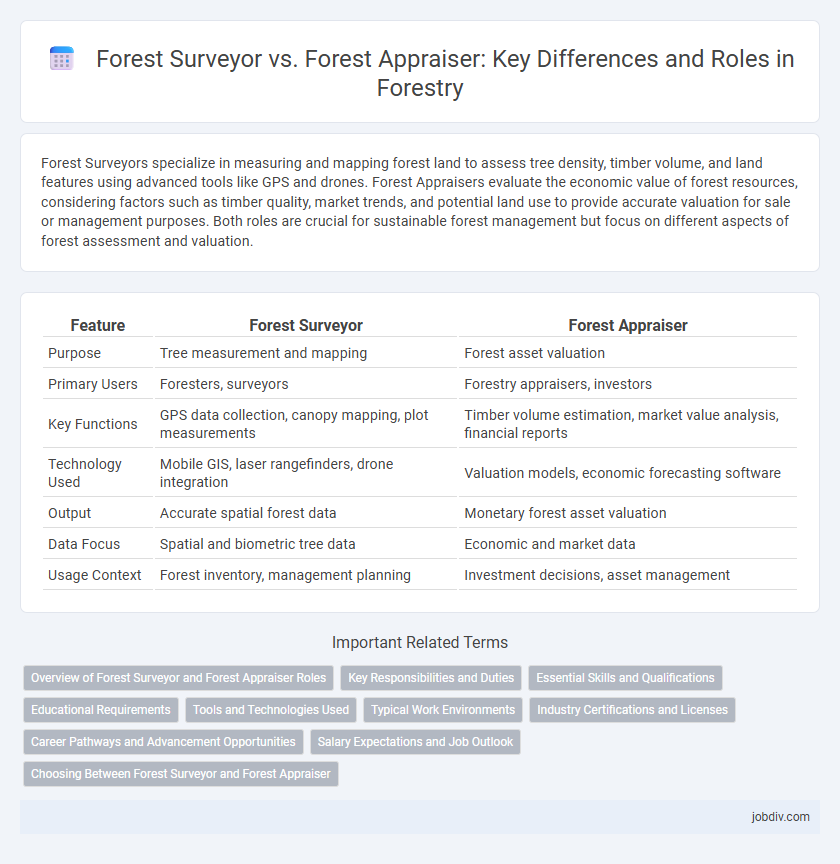Forest Surveyors specialize in measuring and mapping forest land to assess tree density, timber volume, and land features using advanced tools like GPS and drones. Forest Appraisers evaluate the economic value of forest resources, considering factors such as timber quality, market trends, and potential land use to provide accurate valuation for sale or management purposes. Both roles are crucial for sustainable forest management but focus on different aspects of forest assessment and valuation.
Table of Comparison
| Feature | Forest Surveyor | Forest Appraiser |
|---|---|---|
| Purpose | Tree measurement and mapping | Forest asset valuation |
| Primary Users | Foresters, surveyors | Forestry appraisers, investors |
| Key Functions | GPS data collection, canopy mapping, plot measurements | Timber volume estimation, market value analysis, financial reports |
| Technology Used | Mobile GIS, laser rangefinders, drone integration | Valuation models, economic forecasting software |
| Output | Accurate spatial forest data | Monetary forest asset valuation |
| Data Focus | Spatial and biometric tree data | Economic and market data |
| Usage Context | Forest inventory, management planning | Investment decisions, asset management |
Overview of Forest Surveyor and Forest Appraiser Roles
Forest surveyors specialize in mapping, measuring, and assessing forest land to provide accurate data on tree species, volume, and health, supporting sustainable forest management. Forest appraisers focus on determining the economic value of timber and forest properties, using market analysis and appraisal techniques to aid in sales, taxation, and insurance decisions. Both roles require expertise in forestry principles but differ in their primary objectives: surveyors emphasize data collection and land assessment, while appraisers concentrate on valuation and financial impact.
Key Responsibilities and Duties
Forest Surveyors specialize in measuring tree height, volume, and density to assess forest composition and health using tools like clinometers and GPS devices. Forest Appraisers focus on evaluating timber quality, market value, and potential yield to determine land worth for sales or conservation purposes. Both professionals collaborate to inform sustainable forest management and land-use planning decisions.
Essential Skills and Qualifications
Forest Surveyors require expertise in geospatial mapping, dendrometry, and the use of GPS and GIS technologies to accurately measure and analyze forest terrains. Forest Appraisers must possess strong knowledge in forest economics, timber valuation, and environmental regulations to assess the monetary value of forest resources effectively. Both roles demand proficiency in data analysis, attention to detail, and familiarity with sustainable forestry practices.
Educational Requirements
Forest surveyors typically require a bachelor's degree in forestry, environmental science, or natural resources, emphasizing skills in geographic information systems (GIS), cartography, and remote sensing. Forest appraisers often need a similar educational background but may also pursue specialized certifications in forest valuation or real estate appraisal to accurately assess timber and land value. Both roles demand strong knowledge of forest ecology and management, though appraisers focus more on economic assessments while surveyors emphasize precise land measurements.
Tools and Technologies Used
Forest surveyors utilize advanced GPS mapping systems, drone technology, and remote sensing tools to measure forest boundaries, tree density, and topography with high accuracy. Forest appraisers rely on specialized software for timber volume estimation, market analysis, and valuation modeling, often incorporating geographic information systems (GIS) and digital databases. Both professionals increasingly adopt LiDAR technology and mobile data collection apps to improve precision and streamline forest resource management.
Typical Work Environments
Forest Surveyors typically work in rugged outdoor environments, conducting field measurements and mapping forest boundaries using GPS and surveying tools. Forest Appraisers often split their time between outdoor site visits and office settings, where they analyze timber values, assess land conditions, and prepare detailed appraisal reports. Both professionals navigate diverse forest ecosystems but differ in their balance of fieldwork and desk duties.
Industry Certifications and Licenses
Forest surveyors typically hold certifications such as the Registered Professional Forester (RPF) or Certified Forestry Technician (CFT), reflecting their expertise in mapping, measuring, and assessing forest resources. Forest appraisers often acquire credentials like the Accredited Senior Appraiser (ASA) designation from the American Society of Appraisers or state-specific real estate appraisal licenses to validate their ability to evaluate timber and land value. Industry certifications ensure both professionals meet stringent standards in environmental regulations, property assessment, and sustainable forest management practices.
Career Pathways and Advancement Opportunities
Forest Surveyors specialize in mapping, measuring, and assessing forest resources using advanced technologies such as GPS and GIS, setting the foundation for sustainable forest management plans. Forest Appraisers focus on evaluating timber value and land worth, often collaborating with landowners and companies to optimize economic returns and land use. Career advancement for Forest Surveyors typically leads to roles in forest management or GIS specialization, while Forest Appraisers can progress to senior appraisal roles, consulting, or land acquisition expertise.
Salary Expectations and Job Outlook
Forest surveyors typically earn between $45,000 and $75,000 annually, with salaries influenced by experience and geographic location, while forest appraisers command higher wages averaging $60,000 to $90,000 due to specialized valuation skills. The job outlook for forest surveyors shows steady growth driven by increasing demand for sustainable forest management, whereas forest appraisers benefit from expanding markets in timber sales, land development, and conservation projects. Both professions offer positive employment prospects, but appraisers often experience higher salary growth linked to their expertise in financial assessment and regulatory compliance.
Choosing Between Forest Surveyor and Forest Appraiser
Choosing between a forest surveyor and a forest appraiser depends on the specific forestry project goals, as surveyors focus on measuring forest boundaries, tree locations, and terrain features using tools like GPS and GIS technology, essential for land management and planning. Forest appraisers provide precise valuation of timber and forest land based on factors such as species composition, market conditions, and growth potential, crucial for financial assessments and sale transactions. Understanding the difference ensures accurate data collection for forest inventory and reliable monetary estimates for investment decisions.
Forest Surveyor vs Forest Appraiser Infographic

 jobdiv.com
jobdiv.com